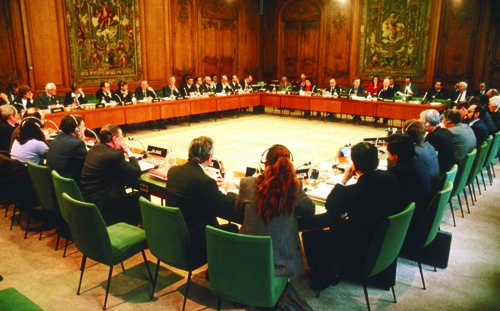
Germany’s poor performance in the 2000 Le test PISA a surpris et préoccupé les acteurs concernés dans ce pays. Par 2012, scores en mathématiques, reading and science were above the OECD average.
Le Programme pour l'évaluation internationale des étudiants (PISA), une enquête internationale triennale, vise à évaluer les systèmes éducatifs du monde entier en testant les compétences et les connaissances des élèves de 15 ans. À ce jour, étudiants représentant plus de 70 économies ont participé à l'évaluation.
Il est important, Germany is one of only three countries that improved in both mathematics performance and equity since 2003. En outre, Germany’s significant improvements in mathematics performance between 2006 et 2009 were largely the result of better performance among low-achieving and disadvantaged students.
Elfriede Ohrnberger, Ministerialrätin of the Bavarian State Ministry of Education, joins me today in La recherche globale pour l'éducation to discuss what Germany did.
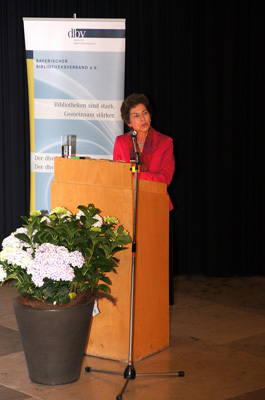
Congratulations on Germany’s success in the 2012 Test du PISA. Was improving your students test results in the PISA exam important to you and why?
After the rather disappointing results for Germany in the first PISA test in the year 2000, the continuing improvement in all the test domains as well as the improvements for specific student groups have been recognized and appreciated warmly.
D'une part, politicians and school administration could assume that the measures that had been taken after the release of the first PISA results were adequate and focused on the relevant areas.
D'autre part, the results that were above the OECD average in the PISA 2012 le test pourrait également être interprété comme une bonne rétroaction aux écoles – étudiants, enseignants, les directeurs et les parents – that their efforts were necessary and successful.

À quoi attribuez-vous votre succès?
German media reported the results of the first PISA test and added comments by journalists, scientists and relevant stakeholders describing these results as a PISA shock for Germany. But Germany took this as a salutary lesson.
After the release of the first PISA results, the Standing Conference of the Ministers of Education and Cultural Affairs of the 16 Länder named seven areas in which the Länder and the Standing Conference of the Ministers of Education and Cultural Affairs would become active (in Germany it is the Länder – the States of Germany – that are responsible for educational affairs):
- Measures to improve linguistic competence as soon as early childhood education.
- Measures to strengthen the link between the early childhood sector and primary school with the aim of an early school entry.
- Measures for the improvement of primary education and the continuous improvement of reading literacy and basic understanding of mathematical and scientific concepts.
- Measures for efficient support of educationally disadvantaged children with particular regard to children and young people with a migrant background.
- Measures to thoroughly develop and assure the quality of teaching and schools on the basis of binding educational standards and result-oriented evaluation.
- Measures to improve professionalism in teaching with particular regard to diagnostic and methodical competence as an element of systematic school development.
- Measures to expand provision of all-day activities and care with the aim of increasing opportunities for education and support, with particular regard to pupils with educational deficits and to especially gifted pupils.
The Länder have implemented concepts/strategies to realize these measures. The measures mark the frame and indicate the aims, but due to their responsibility for educational affairs, each Länder decides on its own about the adequate strategy or concept to be applied. In certain cases, some Länder also follow similar strategies.
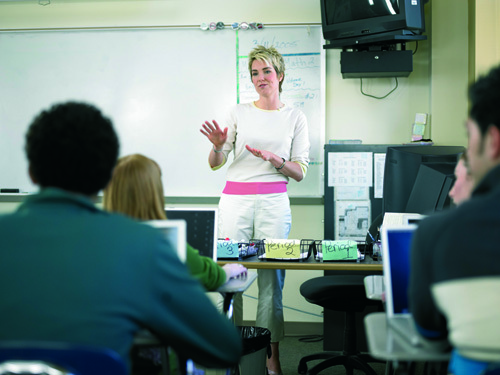
Pouvez-vous expliquer brièvement certaines des stratégies que vous avez utilisées pour atteindre vos objectifs d'enseignement?
En juin 2002, the Ministers of Education and Cultural Affairs adopted a resolution to introduce Bildungsstandards (educational standards) binding for all Länder. Dans 2003 et 2004, educational standards were adopted for the primary sector, la Hauptschulabschluss et la Mittlerer Schulabschluss (secondary school programs). In October 2012, the Standing Conference, on the basis of a decision of October 2007, has resolved educational standards for the Allgemeine Hochschulreife (general higher education entrance qualification) in German and Mathematics and in follow-on courses in the foreign languages of English and French.
En juin 2006, the Standing Conference adopted a comprehensive strategy for educational monitoring which consists of four interconnected areas:
- Participation in international comparative studies of pupil achievement.
- Central review of the achievement of educational standards in a comparison between the Länder.
- Comparative studies within the Länder in order to review the efficiency of individual schools.
- The joint education reporting of the Federation and the Länder.
The evaluation of research and teaching has been provided for in the higher education sector since the amendment to the Framework Act for Higher Education.
The evaluation of study courses and subjects is also established in the higher education legislation of most Länder. In a resolution of March 2002, the Standing Conference laid down the future development of quality assurance for all Länder and institutions of higher education; in the long-term, this should lead to an overall concept for quality assurance, taking account of all types of higher education institutions and all study courses. With the introduction of the accreditation of study courses, the setting up of the Accreditation Council, the foundation of accreditation agencies and the adoption of joint structural requirements for all Länder for Bachelor’s and Master’s study courses, standards and procedures were established for the teaching sector. These should provide students and employers with reliable orientation and create transparency in international cooperation with regard to the study offer and study qualifications in Germany.
En septembre 2005, the Standing Conference of the Ministers of Education and Cultural Affairs of the Länder passed a comprehensive quality assurance framework concept for teaching.
Le 2004 Standards for Teacher Training in the Educational Sciences and the December 2008 edition of the common content requirements for subject-related studies and subject-related didactics in teacher training, which apply to all Länder, serve as the basis for the accreditation and evaluation of teacher-training courses.
In October 2003, the Standing Conference first published a report on the education system in Germany, “Education Report for Germany: First Findings”, which mainly focuses on schools providing general education. The first joint education report of the Federation and the Länder, “Education in Germany”, which mainly focuses on education and migration, was presented in 2006. The second national education report concentrates on the transition from school into vocational education and training, higher education and the labour market, and was presented in June 2008. The third national Education Report, presented in June 2010, was devoted primarily to “perspectives of education in demographic change.”

Ce que le reste du monde peut apprendre de votre expérience?
We do not want to claim that others shall “learn” from us, but we will be happy to share our experience. En Allemagne, the Länder responsible for educational affairs have agreed on necessary measures and have made their implementation a joint enterprise. It has also been a good experience that due to the rather disappointing results in the first PISA test, there has been a broad consensus in society that we must try to implement these measures.
What are the next steps for the German education system, given your achievements so far?
We will try hard to maintain the achievements reached so far which can not be taken for granted, as an analysis of the results of the last PISA test shows.
We will go on trying to improve the development of each individual’s potential. We will continue our efforts to reduce the differences in achievement of students with and without an immigration background, and of boys and girls and of students coming from different social backgrounds.

Photos courtesy of OECD/PISA and Elfriede Ohrnberger
Dans La Recherche globale pour l'éducation, joindre à moi et leaders d'opinion de renommée mondiale dont Sir Michael Barber (Royaume-Uni), Dr. Michael Bloquer (États-Unis), Dr. Leon Botstein (États-Unis), Professeur Clay Christensen (États-Unis), Dr. Linda Darling-Hammond (États-Unis), Dr. Madhav Chavan (Inde), Le professeur Michael Fullan (Canada), Professeur Howard Gardner (États-Unis), Professeur Andy Hargreaves (États-Unis), Professeur Yvonne Hellman (Pays-Bas), Professeur Kristin Helstad (Norvège), Jean Hendrickson (États-Unis), Professeur Rose Hipkins (Nouvelle-Zélande), Professeur Cornelia Hoogland (Canada), Honorable Jeff Johnson (Canada), Mme. Chantal Kaufmann (Belgique), Dr. Eija Kauppinen (Finlande), Le secrétaire d'Etat Tapio Kosunen (Finlande), Professor Dominique Lafontaine (Belgique), Professeur Hugh Lauder (Royaume-Uni), Professeur Ben Levin (Canada), Seigneur Ken Macdonald (Royaume-Uni), Professeur Barry McGaw (Australie), Shiv Nadar (Inde), Professeur R. Natarajan (Inde), Dr. PAK NG (Singapour), Dr. Denise Pape (États-Unis), Sridhar Rajagopalan (Inde), Dr. Diane Ravitch (États-Unis), Richard Wilson Riley (États-Unis), Sir Ken Robinson (Royaume-Uni), Professeur Pasi Sahlberg (Finlande), Professeur Manabu Sato (Japon), Andreas Schleicher (PISA, OCDE), Dr. Anthony Seldon (Royaume-Uni), Dr. David Shaffer (États-Unis), Dr. Kirsten immersive, (Norvège), Chancelier Stephen Spahn (États-Unis), Yves Thézé (Lycee Francais U.S.), Professeur Charles Ungerleider (Canada), Professeur Tony Wagner (États-Unis), Sir David Watson (Royaume-Uni), Professeur Dylan Wiliam (Royaume-Uni), Dr. Mark Wormald (Royaume-Uni), Professeur Theo Wubbels (Pays-Bas), Professeur Michael Young (Royaume-Uni), et le professeur Zhang Minxuan (Chine) alors qu'ils explorent les grandes questions d'éducation de l'image que toutes les nations doivent faire face aujourd'hui. La recherche globale pour l'éducation communautaire page
C. M. Rubin est l'auteur de deux séries en ligne largement lecture pour lequel elle a reçu une 2011 Upton Sinclair prix, “La recherche globale pour l'éducation” et “Comment allons-nous savoir?” Elle est également l'auteur de trois livres à succès, Y compris The Real Alice au pays des merveilles, et est l'éditeur CMRubinWorld.
Suivez C. M. Rubin sur Twitter: www.twitter.com/@cmrubinworld



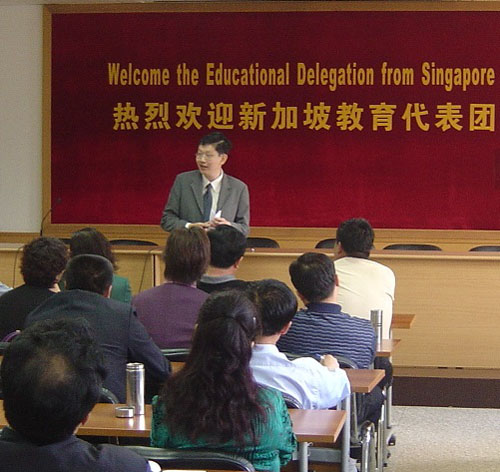
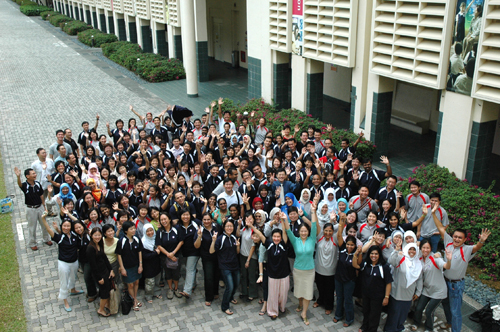
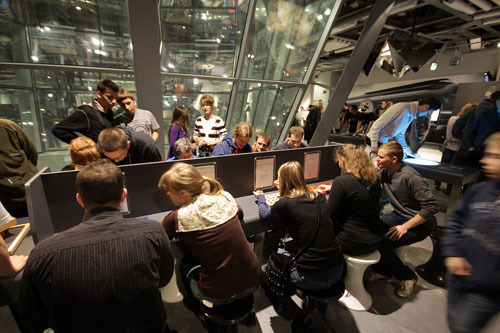
Commentaires récents